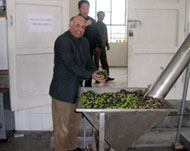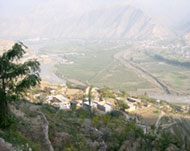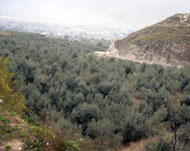China’s first olive harvest strikes oil
A growing Chinese appetite for foreign foods has prompted the growth in popularity of the quintessential Middle Eastern ingredient – the olive.

Initially served in bars on the end of a toothpick as just an amusing accessory to a famous cocktail, the olive is slowly moving out of China’s posh watering holes and onto the country’s dinner plates.
Deemed too bitter by many first time tasters, import and consumption figures suggest middle class China cannot get enough of the Mediterranean fruit and its healthy oil.
Helping lead this culinary revolution is Karim Aljaadi. A 50-something Palestinian, Aljaadi has spent the past two decades promoting Middle Eastern and Mediterranean cuisine across China.
Based out of a five table cafe in Beijing’s Sanlitun entertainment district, he has built up a modest trading company supplying China’s growing Arab community with locally made specialty produce such as cheese and yogurt that taste just like home.
Thriving industry
In 2001, after discovering China’s only olive grove, Aljaadi set about working with farmers in western Gansu province to help turn a dead end venture into a thriving industry.
Last year was his first harvest and the results spoke for themselves.
 |
|
Palestinian Karim Aljaadi has |
“In the past, locals did not really know what do with them. The oil was being used in cosmetics and traditional Chinese medicine. I brought over some seeds from Tunisia and Spain and planted them and now we have almost 1000 tonnes of olives a year,” he told Aljazeera.net.
Far more valuable as a fruit than oil, farmers can get roughly $1 a kilogramme, 10 times what they would earn for growing apples or oranges.
“It takes 17kg of olives to make 1kg of virgin olive oil,” says Aljaadi. “But in Beijing and other Chinese cities, I can sell olives for $3.50 a kilo.”
Secret recipe
Serving them to his patrons, the fleshy olives quickly dissolve in the mouth, leaving a lingering pepper and sweet perfumery taste, evocative of a Middle Eastern hookah (water pipe).
Marinating them in salt water, thyme, lemon juice, lime and olive oil for three months, Aljaadi likes to keep the exact process by which he turns a hard, bitter fruit into a mouth-watering appetizer a secret.
The softness of his olives comes from an initial period of fermentation during which the freshly picked and washed olives are rubbed in salt and left standing for a day.
Climate challenges
First introduced to China in the 1970’s by the Albanians as a token of then close fraternal ties with their communist comrades, preliminary experiments with this foreign tree did not go well.
 |
|
Mountains shelter the groves |
Planted in sub tropical Yunnan province in China’s southwest, the trees failed to bear fruit in the humid climate.
The more recent replanting of trees in the Wudu valley of Gansu, however, has been an inspired choice.
After seeing how fast the olive trees grew, local farmers initially began planting them as a means of soil conservation.
Sheltered from the sub zero Siberian winds and sandstorms that sweep northern China every winter and spring by a series of 2km high mountain ranges, Wudu enjoys an ideal olive growing average annual temperature of 15 degrees Celsius.
Improved methods
However, when Aljaadi first entered the valley in 2001, the olive trees were sparsely planted, poorly maintained and virtually devoid of fruit.
Showing local farmers how to trim the trees, annual harvest shot up from 1kg or 2kg per tree to almost 20kg.
 |
|
Farmers have greatly increased |
“It’s still nothing compared with the Middle East where trees can have as much as 150kg on them,” says Aljaadi.
But he adds that with time, this will change.
Every year another 10 to 20 new farmers plant trees on their land. Now there are over 1000 acres of olive groves.
Bai Xiaoyong is one of these farmers. Tending trees since 1998, he initially pressed his mediocre harvest for oil and sold it for cosmetic purposes as a skin moisturiser.
“Olives were always a sideshow for me, until now that is,” he told Aljazeera.net by telephone from his home in Wudu.
Selling his olives to Aljaadi, Bai says he prefers not to eat them, citing their value and a bitterness he has never got used too.
That he leaves to the country’s growing middle class.
Growing availability
Once only available in the small city grocers catering predominately to expatriates, now big chain supermarkets such as Carrefour are selling olives.
Stocking several varieties of brand name olive oil, they have also started selling small glass jars of imported black olives. It is a trend that is likely to grow.
A major importer of edible oils, Hong Shengping last year handled over 3000 tonnes of olive oil.
|
|
|
The Wudu valley of Gansu enjoys |
This year, he anticipates surging demand will more than double his business to 7000 tonnes.
“Chinese people have heard about how healthy olive oil is and they want it,” he told Aljazeera.net.
But while the growing Chinese market and the success of the olive groves give Aljaadi cause to celebrate, he is reluctant to exploit a labour cost half that of his hometown in Gaza and start exporting his olives.
He says demand in China is growing so quickly there is no need to explore overseas markets.
And besides, good as they are, Chinese olives, “can’t compare in heritage to Palestinian olives”.
“It would be like trying to sell Egyptian tofu to China.”
